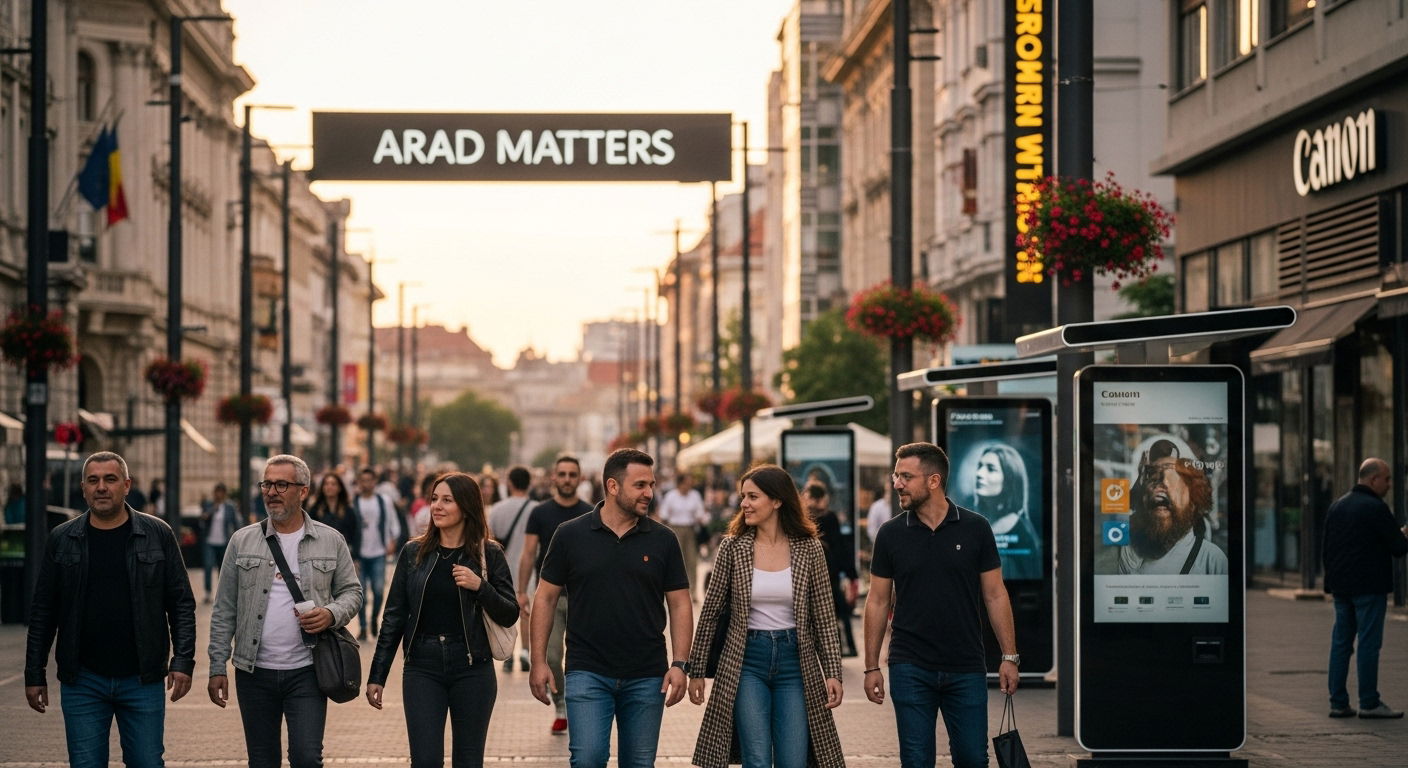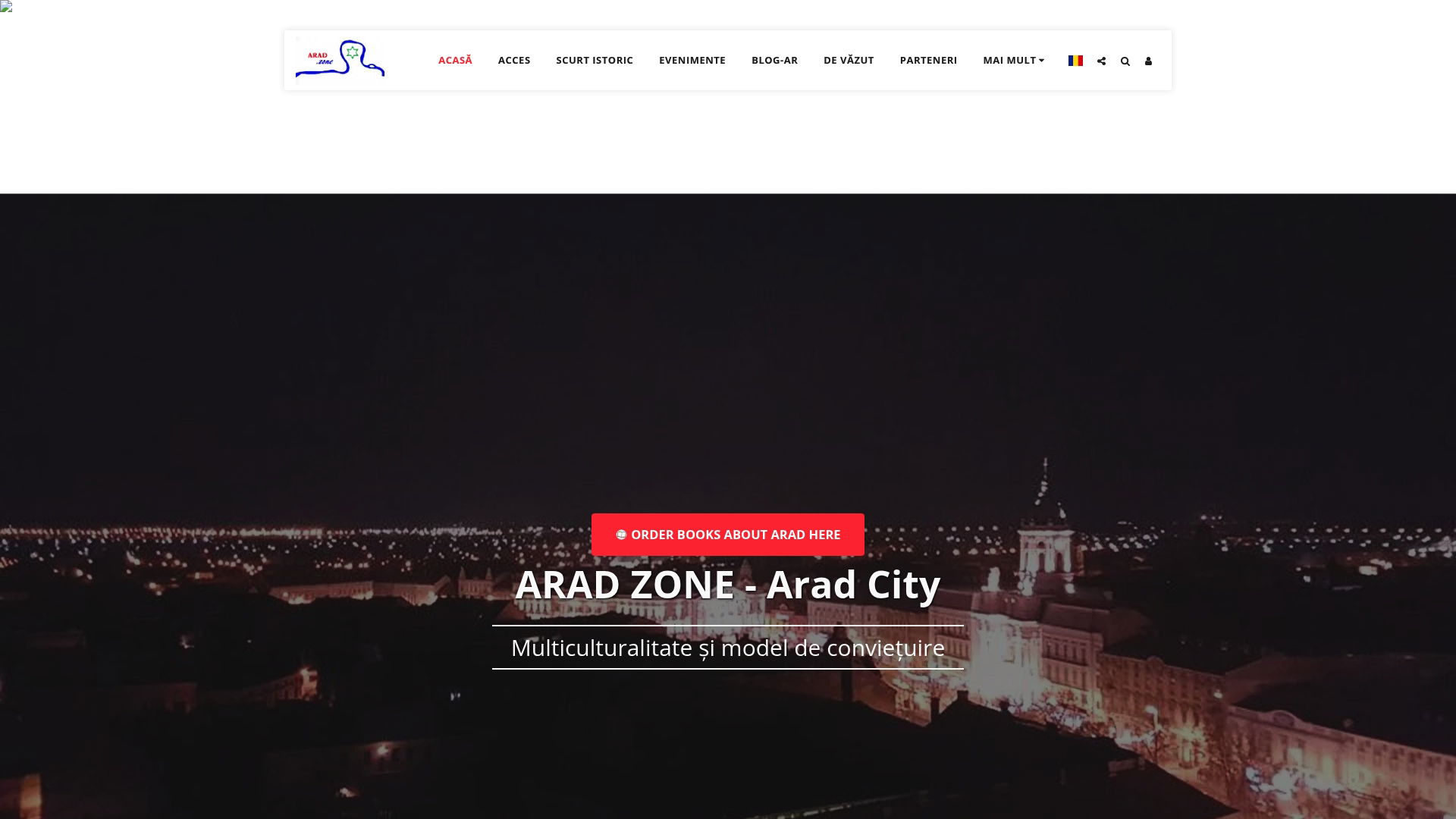Understanding Why Arad Matters in 2025

Arad sits on the western edge of Romania and has quietly shaped the destinies of empires and cultures for centuries. Most people pass through, never realizing that Arad was a critical crossroads for the Ottomans, Habsburgs, and Romanians, each leaving a distinct legacy visible in its streets today. The surprising part is that this city’s true strength comes from how it has turned its diverse challenges into sources of cultural energy, giving Arad a vibrancy that no single influence ever could.
Table of Contents
- What Is Arad And Its Historical Significance
- A Crossroads Of Civilizations
- Architectural And Cultural Heritage
- Why Arad Is A Key Cultural And Economic Hub In 2025
- Strategic Infrastructure And Economic Positioning
- Cultural Diplomacy And International Engagement
- Innovation And Future-Oriented Development
- How Arad's Development Impacts Tourism And Travel
- Infrastructure And Accessibility Enhancements
- Cultural Tourism And Heritage Preservation
- Sustainable And Innovative Tourism Development
- What Unique Experiences Does Arad Offer To Visitors?
- Art And Technology Intersections
- Cultural Immersion And Historical Discovery
- Community And Interactive Experiences
- Understanding The Role Of Arad In Regional Cooperation In 2025
- Strategic Economic Collaboration
- Multicultural Diplomatic Engagement
- Technological And Innovation Networks
Quick Summary
| Takeaway | Explanation |
|---|---|
| Arad's historical crossroads | Arad's strategic location makes it a significant intersection for various cultures and empires through history. |
| Pioneering cultural diplomacy | The city engages in international cultural events, enhancing its global presence and bridging communities. |
| Technological innovation hub | Arad is developing a robust tech ecosystem, attracting investments and fostering entrepreneurship for future growth. |
| Sustainable tourism development | Arad is enhancing its tourism appeal through infrastructure improvements and preserving its rich cultural heritage. |
| Regional cooperation leader | Arad serves as a center for regional collaboration, facilitating trade and cultural exchanges among Central and Eastern Europe. |
What is Arad and its Historical Significance
Arad represents a remarkable urban center in western Romania, embodying centuries of complex cultural and historical transformations. Located strategically near the Hungarian border, this city serves as a pivotal gateway between Central and Eastern European regions, making it significantly more than just another municipal area.
A Crossroads of Civilizations
The historical significance of Arad stems from its unique geographical positioning. Throughout multiple centuries, this region has been a critical intersection for various empires and cultural groups. According to historical research from Britannica, Arad experienced substantial influences from Ottoman, Habsburg, and Romanian administrations, each leaving distinctive marks on its urban landscape and societal structure.Key characteristics that define Arad's historical importance include:
- Strategic trade route location
- Multicultural population interactions
- Significant architectural heritage
- Economic importance in regional commerce
Architectural and Cultural Heritage
Arad's architectural landscape reflects its rich multicultural history. The city showcases remarkable buildings representing different historical periods, from Ottoman-era structures to Habsburg imperial architecture and modern Romanian designs. UNESCO World Heritage documentation highlights the region's profound archaeological and architectural significance, particularly through nearby historical sites like Sarmizegetusa Regia.The city's historical complexity emerges from its ability to integrate diverse cultural influences while maintaining a distinct regional identity. From medieval trading routes to modern urban development, Arad has consistently demonstrated remarkable adaptability and resilience, transforming challenges into opportunities for cultural and economic growth.To help readers quickly compare how different empires influenced Arad, the table below outlines key contributions and legacies left by the Ottoman, Habsburg, and Romanian administrations.
| Empire/Administration | Period of Influence | Architectural Legacy | Cultural Impact | Lasting Mark in Arad |
|---|---|---|---|---|
| Ottoman | 16th - 18th centuries | Select Ottoman-era structures | Introduced eastern customs | Trade routes and multicultural fabric |
| Habsburg | 18th - early 20th centuries | Imperial-style public buildings | Central European traditions | Grand boulevards, civic institutions |
| Romanian | 20th century onward | Modern national designs | Strengthening Romanian culture | Contemporary cultural identity |
Understanding Arad means recognizing it as more than a geographical location - it is a living narrative of human interaction, cultural exchange, and historical progression.
Why Arad is a Key Cultural and Economic Hub in 2025
Arad emerges as a transformative urban center in western Romania, positioned strategically to become a significant cultural and economic powerhouse by 2025. Its unique combination of geographic location, technological innovation, and cultural depth positions it as a critical nexus for regional development and international collaboration.
Strategic Infrastructure and Economic Positioning
According to the Intelligent Cities Challenge research, Arad has been systematically developing its infrastructure to create a robust, technology-driven business ecosystem. The city serves as the primary western gateway of Romania, situated on crucial Pan-European transportation corridors that connect multiple economic regions.Key economic advantages of Arad in 2025 include:
- Advanced digital infrastructure
- Strategic transportation network connectivity
- Proximity to major European trade routes
- Strong public-private sector collaboration
- Innovative technological implementation
Cultural Diplomacy and International Engagement
Beyond economic metrics, Arad distinguishes itself through proactive cultural diplomacy. The city has been expanding its international presence by hosting significant cultural events and creating meaningful cross-border connections. Cultural exchange has become a fundamental strategy for Arad's global positioning.Notable cultural initiatives demonstrate Arad's commitment to international engagement. Events like the "Days of Arad Culture" in Vienna showcase the city's rich heritage and contemporary artistic expressions, creating platforms for meaningful dialogue and mutual understanding between different European communities.
Innovation and Future-Oriented Development
Arad's vision for 2025 centers on transforming traditional economic models through technological innovation and sustainable development. The city has been attracting significant investments, creating an environment that supports entrepreneurship, technological advancement, and creative industries.By integrating smart city technologies, supporting educational partnerships, and maintaining a forward-looking approach, Arad is positioning itself not just as a regional player but as a sophisticated, adaptable urban center ready to meet the complex challenges of the 21st century.

How Arad's Development Impacts Tourism and Travel
Arad represents a remarkable example of urban transformation driving tourism potential, leveraging its strategic location and rich cultural heritage to create compelling travel experiences. By systematically developing infrastructure, preserving historical sites, and promoting cultural initiatives, the city has positioned itself as an emerging destination for diverse travelers.
Infrastructure and Accessibility Enhancements
According to the United Nations World Tourism Organization, cities that strategically improve transportation and connectivity significantly boost their tourism appeal. Arad has been implementing comprehensive infrastructure upgrades that make travel smoother and more attractive for international and domestic tourists.Key infrastructure improvements driving tourism include:
- Advanced transportation networks
- Digital tourist information systems
- Modernized accommodation facilities
- Enhanced road and rail connectivity
- Multilingual tourist support services
Cultural Tourism and Heritage Preservation
Arad's commitment to preserving and showcasing its multicultural heritage has become a primary driver of tourism development. The city offers visitors an immersive journey through different historical periods, with architectural landmarks and cultural events that highlight its rich, diverse background.Cultural tourism strategies focus on creating authentic, engaging experiences that connect travelers with the city's unique historical narrative. Museums, architectural tours, and heritage sites provide deeper insights into Arad's complex cultural landscape, attracting history enthusiasts and cultural explorers.
Sustainable and Innovative Tourism Development
The city's approach to tourism goes beyond traditional models, emphasizing sustainable practices and innovative visitor experiences. By integrating technology, supporting local businesses, and creating environmentally conscious tourism infrastructure, Arad is developing a forward-thinking travel ecosystem.Through strategic planning and investment, Arad is transforming from a transit point to a destination, offering travelers a unique blend of historical depth, cultural richness, and modern urban experiences that distinguish it in the competitive European tourism landscape.This table summarizes the main strategies Arad uses to boost tourism and enhance the visitor experience as highlighted in the article.
| Strategy Area | Key Actions | Intended Outcome |
|---|---|---|
| Infrastructure Improvements | Upgrading transportation, digital information systems | Smoother and more attractive travel |
| Heritage Preservation | Showcasing architecture, museums, historical tours | Increased cultural tourism |
| Sustainable Tourism | Integrating technology, supporting local businesses | Environmentally conscious and innovative tourism |
| Community Experiences | Interactive events, local workshops | Deeper visitor engagement |
What Unique Experiences Does Arad Offer to Visitors?
Arad emerges as a distinctive destination offering travelers immersive, multifaceted experiences that blend historical richness, technological innovation, and cultural dynamism. The city provides visitors with opportunities to explore beyond traditional tourist pathways, creating memorable encounters that engage multiple senses and perspectives.
Art and Technology Intersections
According to the DARV collective research, Arad has been pioneering innovative approaches to cultural engagement through technology-driven artistic experiences. Interactive art installations and augmented reality exhibitions transform how visitors perceive and interact with the city's cultural landscape.Unique technological and artistic experiences include:
- Augmented reality museum tours
- Interactive public art installations
- Digital heritage reconstruction projects
- Multimedia cultural performance spaces
- Technology-enhanced historical narratives
Cultural Immersion and Historical Discovery
Arad offers visitors profound cultural immersion opportunities that extend far beyond traditional sightseeing. The city's multicultural heritage provides a rich tapestry of experiences, allowing travelers to explore complex historical narratives through museums, architectural tours, and living cultural events.Visitors can engage with the city's diverse historical layers, experiencing how different civilizations have shaped Arad's unique identity. Walking tours, historical reenactments, and community-driven cultural programs provide deep insights into the region's complex social dynamics.
Community and Interactive Experiences
What distinguishes Arad is its commitment to creating participatory visitor experiences. Unlike passive tourism models, the city encourages active engagement through community workshops, local interaction programs, and immersive cultural events that connect travelers directly with local residents.Through strategic initiatives that blend education, technology, and cultural exchange, Arad transforms from a mere destination into a dynamic, interactive environment where visitors become active participants in the city's ongoing narrative of discovery and innovation.
Understanding the Role of Arad in Regional Cooperation in 2025
Arad emerges as a pivotal center for regional cooperation in 2025, strategically positioning itself as a collaborative hub that bridges multiple economic, cultural, and technological domains. Its unique geographical location and progressive approach to international engagement make it an essential nexus for cross-border dialogue and mutual development.
Strategic Economic Collaboration
According to the International Trade Centre research, regional cooperation represents a critical mechanism for economic growth and sustainable development. Arad exemplifies this principle by creating robust networks that facilitate trade, knowledge exchange, and joint economic initiatives across Central and Eastern European regions.Key economic collaboration strategies include:
- Developing cross-border business partnerships
- Facilitating technological knowledge transfer
- Supporting small and medium enterprise networking
- Creating shared innovation platforms
- Establishing transnational investment frameworks
Multicultural Diplomatic Engagement
Arad's approach to regional cooperation transcends traditional economic interactions, emphasizing cultural understanding and diplomatic soft power. By hosting international conferences, cultural exchanges, and collaborative educational programs, the city builds bridges between diverse communities and institutional frameworks.The city leverages its rich multicultural heritage as a diplomatic asset, creating platforms for dialogue that address complex regional challenges through mutual understanding and collaborative problem solving.
Technological and Innovation Networks
In 2025, Arad distinguishes itself by positioning technology and innovation as central pillars of regional cooperation. The city has developed collaborative frameworks that connect universities, research institutions, and technology companies across different national boundaries.By fostering an ecosystem of shared technological resources and joint research initiatives, Arad transforms from a local urban center into a strategic node of regional innovation and collaborative development. Its commitment to open, transparent, and mutually beneficial cooperation sets a compelling model for regional integration in the 21st century.
Ready to Discover Arad's True Impact in 2025?
Arad is no longer just a stop along the way. As explored in the article "Understanding Why Arad Matters in 2025," the city stands at the intersection of history, culture, and innovation. If you have ever wondered how Arad's multicultural legacy or ambitious growth could impact your future travels or research, you are not alone. Many readers are searching for insider access to authentic information, cultural stories, and practical tips for navigating this emerging Central European hub.

Unlock the full story with Arad.zone. Dive deeper into Arad's role as Romania's gate to the West and gain unique perspectives from our curated books and blog. Do not just read about Arad's transformation. Join a passionate community that celebrates its hidden gems and vibrant future. Visit Arad.zone now and experience the real stories behind this remarkable city.
Frequently Asked Questions
What are the historical influences that shaped Arad?
Arad has been influenced by various empires, including the Ottoman, Habsburg, and Romanian administrations, which have left distinct marks on its architectural landscape and cultural heritage.
How is Arad positioning itself as a cultural and economic hub by 2025?
Arad is enhancing its infrastructure, fostering public-private partnerships, and engaging in cultural diplomacy to create a robust economy and establish itself as a significant cultural center in the region.
What initiatives is Arad taking to boost tourism in 2025?
Arad is improving transportation infrastructure, preserving historical sites, and focusing on cultural tourism strategies to attract more visitors and create engaging travel experiences.
How is technology impacting Arad's development for the future?
Technology is playing a central role in Arad's development through initiatives like smart city technologies, augmented reality in cultural experiences, and fostering innovation in local businesses, making the city a forward-thinking urban center.